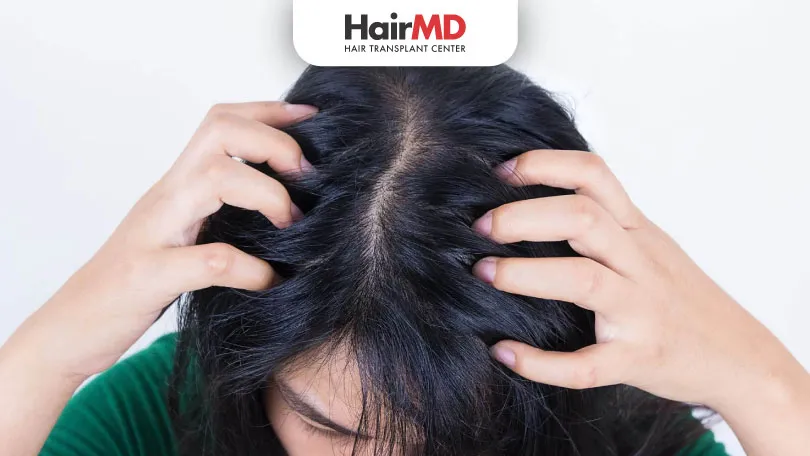12th Jan, 2024

What’s covered in the article?
- What are the Causes of Scalp Sensitivity?
- What are Symptoms of a Sensitive Scalp?
- What are Sensitive Scalp treatments?
- FAQs
- Conclusion
What are the Causes of Scalp Sensitivity?
- Health conditions like migraine, tension headache, psoriasis, lice infestation, infection, dandruff, and other skin disorders, can lead to scalp sensitivity, causing tenderness, inflammation, irritation, and pain in the scalp region.
- Folliculitis, furunculosis, and carbunculosis are some infections of the hair follicles that cause scalp sensitivity to touch.
- Scalp sensitivity and hair loss are interlinked because alopecia areata, a type of hair loss, can lead to a sensitive scalp, and scratching an itchy, sensitive scalp can damage the hair follicles, leading to hair fall.
- Extreme climatic conditions can lead to scalp sensitivity.
- Stress is another reason for a sensitive scalp.
What are Symptoms of a Sensitive Scalp?
- The common symptoms of a sensitive scalp include burning and stinging in the scalp region, discomfort in that skin area, and dryness of the scalp skin.
- Numbness and pain may also be experienced in the scalp region.
- Peeling, flaking, and scaling of the skin in the scalp region may also be seen.
- Scalp tenderness is often accompanied by conditions like psoriasis, eczema, headaches, allergies, and hair loss.
- In some people, the scalp goes numb, which is often a result of injury or a pinched nerve, while in many others, there is scalp sensitivity to touch, which means even a slight touch to the scalp is painful.
What are Sensitive Scalp treatments?
Gentle Hair Care Products:Choose sulfate-free and hypoallergenic shampoos and conditioners to minimize irritation. Look for products with natural, soothing ingredients like chamomile or aloe vera.
Avoiding Harsh Chemicals:Steer clear of hair products containing harsh chemicals, dyes, or fragrances that can trigger sensitivity. Opt for milder formulations to maintain scalp health.
Aloe Vera Applications:Aloe vera’s anti-inflammatory properties can provide relief. Apply aloe vera gel directly to the scalp to soothe irritation and reduce redness.
Tea Tree Oil:Known for its antimicrobial properties, tea tree oil can help address underlying scalp issues. Dilute it with a carrier oil and massage it onto the scalp.
Regular Scalp Massages:Gently massage the scalp to improve blood circulation, promoting nutrient delivery to hair follicles and relieving tension.
Clinical Treatments:In more severe cases, clinical hair treatments may be necessary. These can include prescription shampoos, corticosteroid injections, or light therapy administered under the guidance of a dermatologist.
Dermatologist Consultation:If symptoms persist, seeking professional advice is essential. A best hair doctor can provide personalized solutions, diagnose underlying conditions, and recommend appropriate medical interventions for long-term relief.
This is everything you should know about scalp sensitivity and hair loss and about how to prevent and treat tenderness and pain in the scalp region. If this does not work, visit your dermatologist for proper diagnosis and treatment according to the condition. For expert advice on treating scalp sensitivity and hair loss and any other hair conditions, one of the best places to approach is HairMD, a reputed hair transplant centre in Pune. Their team of experienced dermatologists will guide you well and give you the best hair treatments to help you achieve beautiful tresses.
FAQs
- What causes scalp sensitivity?
Scalp sensitivity can be triggered by various factors, including health conditions like migraines, tension headaches, psoriasis, lice infestation, infections, and stress.
- How does scalp sensitivity relate to hair loss?
Conditions like alopecia areata, a type of hair loss, can lead to a sensitive scalp. Scratching an itchy, sensitive scalp may damage hair follicles, contributing to hair fall.
- What are the common symptoms of a sensitive scalp?
Symptoms include burning, stinging, discomfort, dryness, numbness, pain, peeling, flaking, and scaling of the scalp skin. Conditions like psoriasis, eczema, headaches, allergies, and hair loss may accompany scalp tenderness.
- How can I treat scalp sensitivity at home?
Use gentle, sulfate-free shampoos and conditioners. Avoid harsh chemicals, opt for aloe vera or tea tree oil applications, and indulge in regular scalp massages. These practices can help soothe irritation and improve scalp health.
- When should I seek professional help for scalp sensitivity?
If symptoms persist, it’s essential to consult a dermatologist. They can provide personalized solutions, diagnose underlying conditions, and recommend clinical treatments such as prescription shampoos, corticosteroid injections, or light therapy for long-term relief.
Do You Know?
Nearly 250 Patients Visit HairMD
Everyday For Various Hair Concerns?
(You are one click away from flawless skin)
Meet Our Dermatologists
Conclusion
Further Reading
Itchy Scalp and Hair Loss: Causes, Treatments, and Prevention
Itchy scalp and hair loss can be troubling, hinting at deeper scalp and hair health issues. Discover the connection in this comprehensive guide.
Dandruff Fungus Treatment
Learn how dandruff and fungus impact scalp health. With HairMD, you can get expert advice on causes, treatments, and prevention tips to maintain a healthy, flake-free scalp.
Helmet Use and Hair Loss: What You Need to Know
Does wearing a helmet cause hair loss? Understand the connection, debunk myths, and explore preventive tips with expert insights from HairMD.
Top Causes of Hair Loss in Women and How to Address Them
Discover the key causes of hair loss in women, including hormonal changes, stress, and nutritional deficiencies. Learn effective solutions and treatments with HairMD experts.
Have thoughts? Please let us know
We are committed not only to treating you, but also educating you.











